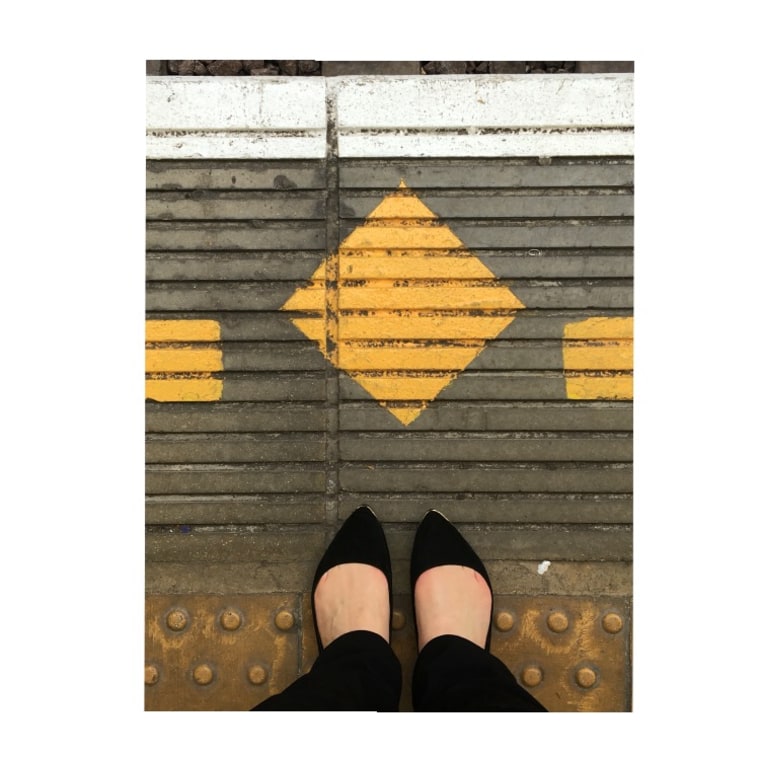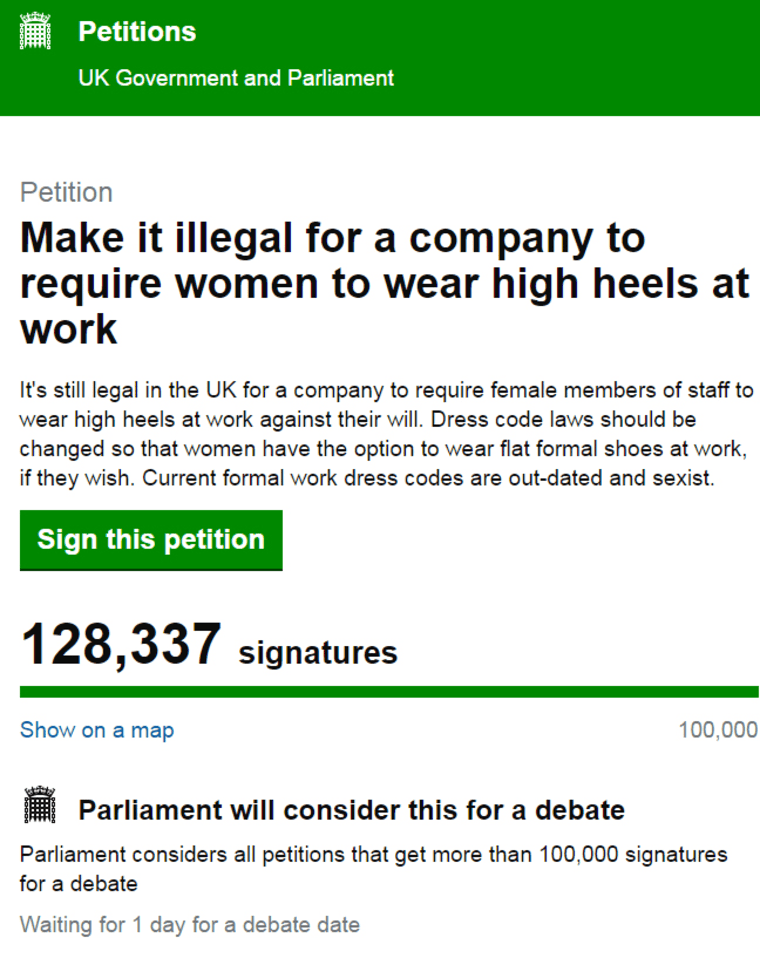A temp worker sent home for failing to wear the right shoes has challenged her former employer — and now the British government — for a policy she says is as wobbly as the high heels she was required to wear.
Nicola Thorp, 27, said she was sent home from her first day on the job as a receptionist at a major accounting firm because she refused to swap out the professional-looking flats she wore at the time for the heels required by the temporary employment agency that had just placed her.
“When I arrived, the supervisor said, ‘Well, you can’t wear those.’ I said, ‘Why not? They’re fine. They’re smart. They’re flat,’” she told TODAY. “And she said, ‘No. We have a policy that all female receptionists have to wear 2- to 4-inch heels. Go out and buy a pair, or else I’m sending you home.’ And I refused, so I was sent home without pay.”

Before she left, Thorp pointed out that a male colleague next to her was wearing flats and called it discriminatory to be sent home when he wasn’t.
“The supervisor just laughed at me and sent me on my way,” she said.
Thorp, an actress who works temp jobs between her acting gigs, said the incident occurred on her first day with a new outsourcing agency, but that she has worked as a receptionist plenty of times for other temp companies without a single problem.

Last week, Thorp filed a petition with the British Parliament to make it illegal for companies to require female staffers to wear high heels at work. She needed 10,000 signatures for a government response, and 100,000 for Parliament to consider the issue for debate. By Monday, less than a week later, the petition received more than 136,000 signatures.
RELATED: Waitress shares photo of her bleeding feet after working in high heels
While Thorp called the response "amazing," she also added with a laugh, "Why on earth are we debating in Parliament whether a woman should be forced to wear high heels?
"We’ve got wars going on. Why are we debating this? High heels? But this is not just about shoes. It’s about women’s rights and the way women are treated and seen.”

In England, there are no national “dress code laws,” and employers generally have the right to enforce a company policy that can make a “reasonable request” about their employee’s appearance, said attorney Anna Birtwistle, a partner at CM Murray, a London firm that specializes in employment law.
RELATED: J.C. Penney employee sent home for wearing shorts she bought — at J.C. Penney
Whether a dress code discriminates on gender, religion or other grounds depends on case law, and she said there’s plenty of it, including the case involving a man who said being forced to wear a shirt and tie to work was a form of sexual discrimination since women didn’t have the same mandate.
“The proper approach in cases involving different standards for male/female employees is not to compare which particular garments men and women were required to or prohibited from wearing, but rather to look at the overall effect of the rules in force,” Birtwistle said in an email. “In the case of the man complaining about having to wear a shirt and tie, the consideration was whether ‘applying contemporary standards of conventional dress,’ (and) the level of smartness required by the employer could only be achieved for men by requiring them to wear a collar and tie.”
RELATED: How to walk in heels: 12 tips and tricks from experts
After Thorp's petition started drawing attention, Portico, the outsourcing company that sent her home for not wearing heels, decided to change it policy and now allows its female workers to wear "plain flat shoes," it said in a statement. The decision was in part because its client, PricewaterhouseCoopers, where Thorp was supposed to work, had asked Portico “to review and revise our policy.”
Thorp's interaction with Portico took place last December, but she didn't file her petition until last week after taking time to consult with a public employment counselor about her rights. She also delayed speaking out in fear of backlash from future employers. Although she has received some negative comments, Thorp said she's been pleased that most people recognize the much larger issue at play.
“It’s how women are perceived at work, and how women are perceived if they want to stand up for themselves,” she said. “There is such a long history of women just putting up with stuff, and not being taken seriously when they make complaints about things like heels, or skirts or makeup. It’s part of this deeply embedded, archaic gender stereotyping. This sort of ‘Mad Men,’ 1950s notion that a receptionist is somebody who’s a bit of eye candy.”
RELATED: '3-inch heels kill': Savannah jokes with fans after nasty plaza tumble
Thorp is currently working on a BBC television show, but temp work continues to be a part of her life to supplement her income. She said she now works for a different temp agency that stands completely behind her efforts.
“This is very much just the first step, and I hope that as a result of the attention this campaign has got, more women will start talking about their experiences,” she said. “And I’ve had such an overwhelming support from men, as well, who’ve just gone, ‘Hang on — we didn’t know this was a thing! Absolutely we support you, because we’re not equal unless we support women’s rights.'”
Follow TODAY.com writer Eun Kyung Kim on Twitter.